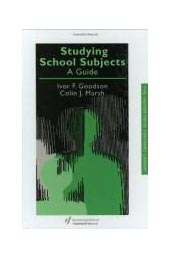Studying School Subjects: a guide
Conclusions, Complexities and Conjectures
Whilst certain aspects of curriculum control and 'territorial' response therefore seem complex and difficult to generalise about, other issues are less so. The general nature of subject communities and the pervasive direction of subject definition and promotion can be clearly discerned. Subject sub-groups (and versions of the subject) may focus on issues such as pedagogy and utility as well as intellectual worth. In the long run, however, the sub-group and the version of the subject which is likely to be successfully promoted is that most in harmony with the material interests of the subject's scholars and teachers. Given the link between knowledge status and resources, subjects can best promote themselves through the academic tradition.
The legacy of differentiated status for the academic, utilitarian and pedagogic traditions draw on tripartite patterns of educational organisation. In considering curriculum change it is vital to understand that this tripartite hierarchy of status has been reproduced not only in the respective parity of esteem between different categories of subject but also to kinds of knowledge within subjects. At the latter level, scrutiny of what counts as education' is necessary. For instance, much of the debate about teaching craft and technology as a way of reinstating practical curricula has missed this point. Given the status patterns discerned one might expect that even if technology were to achieve high status and acceptance the version which would 'count as education' would be academic and theoretical and therefore stand in contradiction to more practical objectives. The differentiated status of academic, utilitarian and pedagogic traditions pervades both the type of subject and the internal form of each subject. Curriculum reform needs to address both of these levels of differentiation.
The differentiated status of the three curriculum traditions discerned and their link with the way finance and resources are allocated and pursued is confirmed by a number of studies already undertaken.
Banks' study of parity and prestige in the English secondary system ends by stressing 'the persistence of the academic tradition' throughout that period of the system's existence.[i] Hanson's study of art education and Dodd's work on technology offer similar evidence[ii]. The latter speaking of the Crowther Report noted that they had shown how 'an alternative route to knowledge' lay through practical subjects which did not destroy the intellectual curiosity of the pupil in the way associated with the 'academic' ones. Dodd notes that 'the problems lay in the status of practical subjects by tradition second class... Discussion on its own is insufficient and it requires legitimization by those institutions who hold this facility (universities, examination boards, employers and society at large[iii].
[i] See Banks, 'Parity and Prestige'.
[ii] See Chapter 1, footnotes 12 and 13.
[iii] Dodd, 'Design and Technology'.
